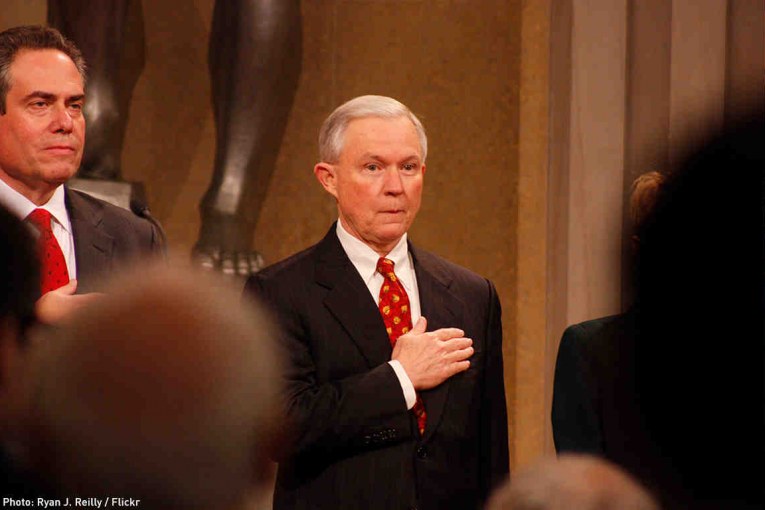

By Taylor Pendergrass
Rumors of the demise of the War on Drugs have been greatly exaggerated, but there have been some recent signs of a draw down. Both red and blue states have been taking steps to reduce incarceration for people charged with drug-related offenses. At the federal level, changes to sentencing guidelines and policies giving prosecutors more discretion in prosecuting drug crimes, implemented by former Attorney General Eric Holder, is credited for a major part of the 14 percent drop in the federal prison population.
That progress, however, did not sit well with the current attorney general, Jefferson Beauregard Sessions, III.
On May 12, Sessions single-handedly resurrected a mass incarceration zombie by revoking the Holder policy and reimplementing an approach that is likely to maximize prison time for any person the federal government charges with a drug crime. Sessions’ move ignores a widespread bipartisan consensus and disregards all available evidence about what actually improves public safety when it comes to drug use (hint: it’s not incarceration).
If you are wondering how a single individual has the power to flood federal prisons, ruin lives, and deepen racial disparities all with the stroke of a pen — welcome to the world of prosecutors. As America’s top prosecutor, Sessions and his staff prosecutors have almost unchecked power to determine who goes to federal prison and for how long.
Sessions is set to use power in a way that will cause tremendous damage. While the federal prison population is only about 10 percent of the total incarcerated population in the United States, nearly half of the 200,000 people currently in federal prisons are there for drug crimes, a number that may swell under Sessions’ policy.
Sessions’ extraordinary authority as a prosecutor is not unique. It’s no different than the power similarly wielded by approximately 3,000 district attorneys and other top local prosecutors throughout the United States.
In America’s modern criminal legal system, more than nine out of 10 cases are resolved by plea bargain where a judge has little or no role. Instead, it’s the prosecutor alone who determines who to charge, what charges to bring, and what plea bargain to offer. These decisions are largely hidden from public view and are subject to little or no outside oversight.
Increasing numbers of top prosecutors are moving in the opposite direction of Sessions by unilaterally implementing policies that reduce incarceration. These prosecutors are not only responding to evidence showing that incarceration is costly and often counterproductive, but they are also responding directly to demands from crime victims and voters who overwhelmingly prefer a focus on treatment and rehabilitation over years-long prison sentences.
The public’s clamor for a new approach from prosecutors reached deafening levels last week in Philadelphia, where voters in the Democratic primary sent Larry Krasner on to the general election. The criminal defense attorney ran on a platform of reducing incarceration and addressing racial inequalities.
That result followed a massive nonpartisan voter education campaign involving numerous community organizations and groups, including the ACLU. The ACLU of Pennsylvania and the ACLU’s national Campaign for Smart Justice focused on educating ACLU members about the power and importance of their local district attorney by sending the most authoritative emissaries possible: people who have been involved in the criminal justice system.
It’s an approach the Campaign for Smart Justice plans to replicate across the country in upcoming years. And as communities become more empowered, we expect to see fewer and fewer top prosecutors like Jeff Sessions in office. Indeed, change is already occurring. Sessions’ recent move was quickly denounced by dozens of locally elected prosecutors.
But Sessions’ recent actions should also make clear that there is more fundamental problem with prosecutorial power than simply how it is used. Sessions’ policy is not actually new. In 2003, then-Attorney General John Ashcroft first issued memos directing federal prosecutors to pursue the most serious charges against people accused of federal drug crimes. Holder then rescinded that policy in 2010. Sessions’ memo this month revokes Holder’s policy and essentially returns to the Ashcroft approach.
The freedom, dignity, and lives of tens of thousands of Americans should not see-saw back-and-forth based only on policy prerogatives of a single prosecutor. Put simply, that is just far too much power for anyone to have, regardless of whether that person is Jeff Sessions, Eric Holder, or Larry Krasner. For that reason, the long view for prosecutorial reform must also be equally focused on across-the-board changes reducing prosecutorial power.
Those reforms must include far more transparency, accountability, and oversight of prosecutorial offices; closer scrutiny by policymakers before approving prosecutorial budgets; permanently diverting public health issues, including drug use, entirely outside the criminal justice system; and sentencing reforms that vastly reduce the severity of punishments available to prosecutors and dramatically increase the availability of non-incarceration alternatives like restorative justice.
Even as communities work to ensure that people like Sessions cannot find a job as top prosecutors in our local communities, we must also work to create a world where prosecutorial power — however exercised — is far more limited and subject to much greater accountability.
Taylor Pendergrass is the Strategic Advisor of the Smart Justice Campaign
